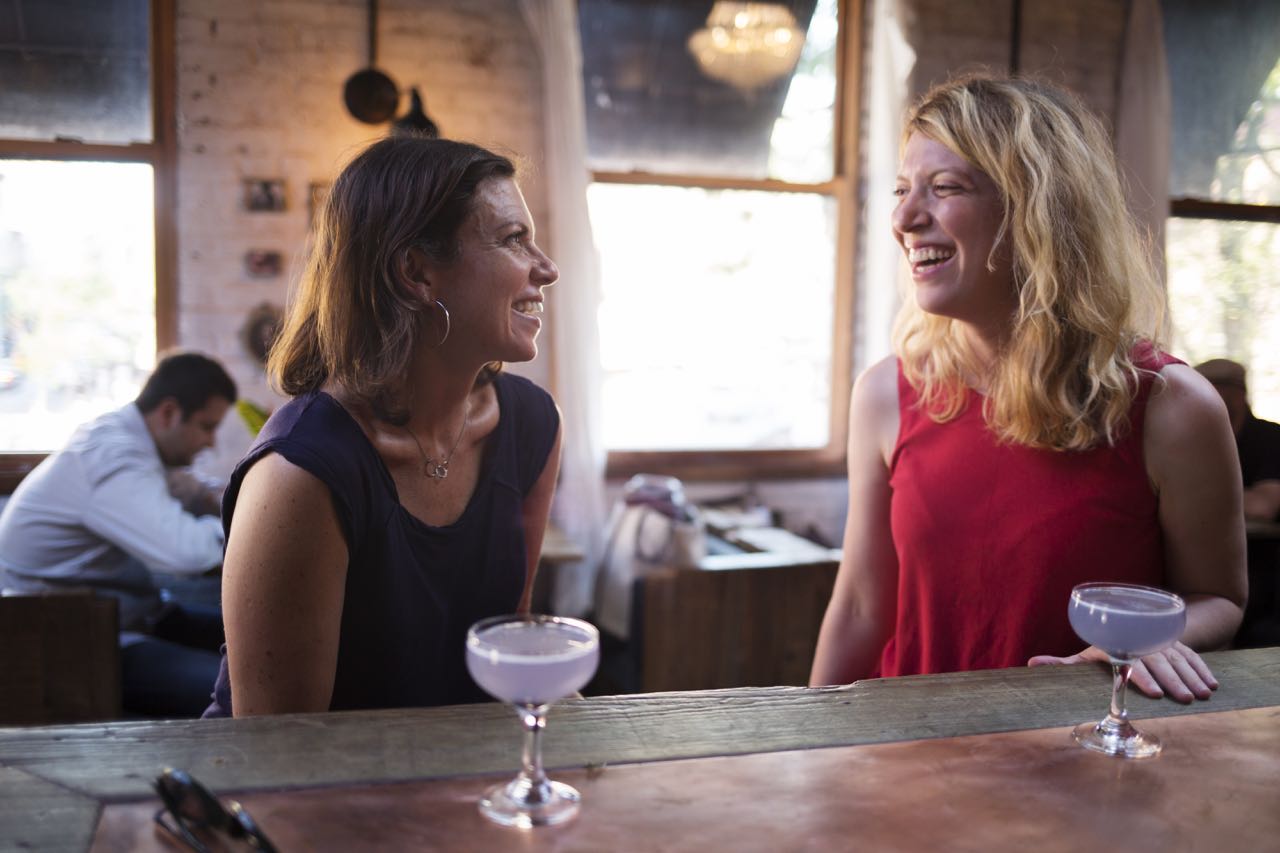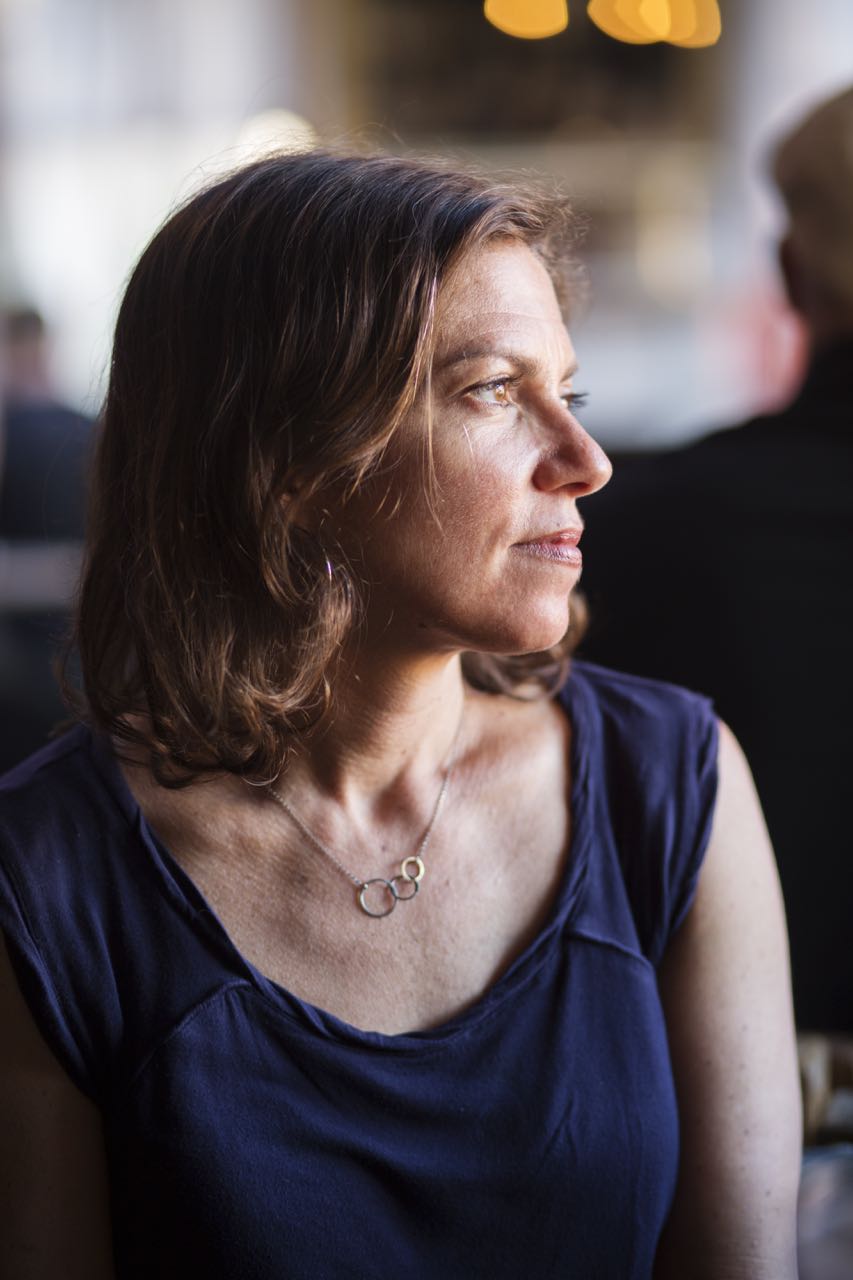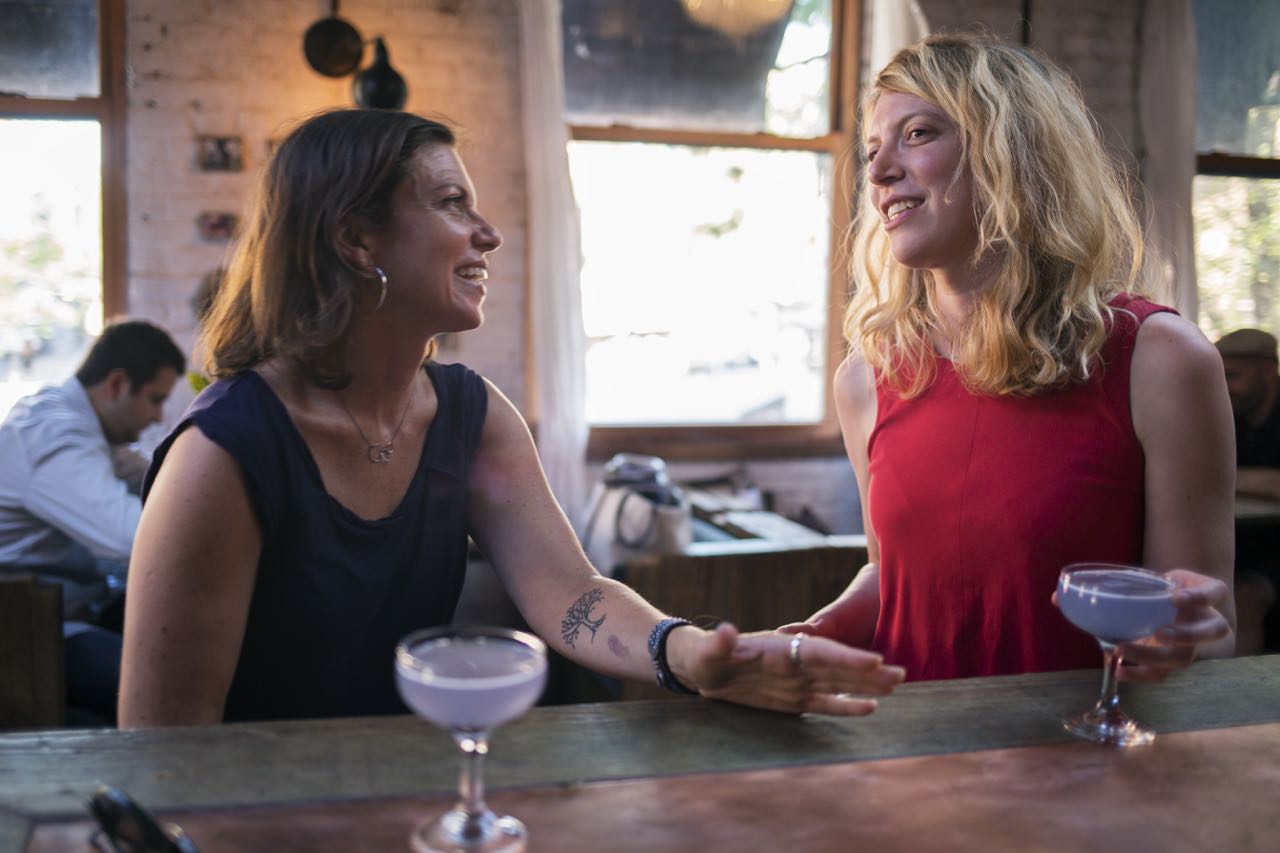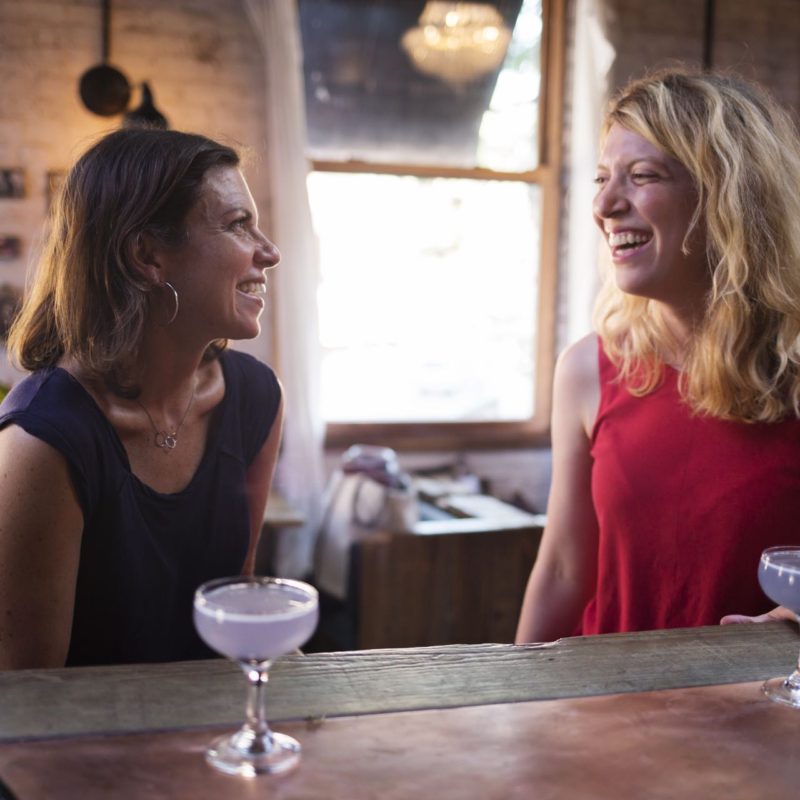A Writer and a Director Walk into a Bar: Lucy Teitler and Kimberly Senior

Photography by Tess Mayer
August 3rd, 2016
“FYI, to get to the bar you have to go inside the pizza place and walk up the flight of stairs in the back.” On a recent Wednesday evening between preview performances of Engagements at Second Stage Uptown, we took playwright Lucy Teitler and director Kimberly Senior to The Garret in the West Village, which is located over a Five Guys outpost. Over aviation cocktails (gin, maraschino liqueur, crème de violette, and lemon juice), they talked about working together and working on a comedy. We put a tape recorder in front of them. Here are excerpts from their conversation.
On Their First Meeting and the Science of Comedy:
Kimberly: Okay, so, we met through Chris Burney. Chris Burney is the Associate Artistic Director at Second Stage and the curator of the Second Stage Uptown, which every summer is committed to doing a season of new plays. And they had already selected Engagements. I don’t know the whole story, but I think Lucy had to meet a bunch of people…
Lucy: Not that many. Like, four people I think. One of the things that I remember most from our meeting is that Kimberly talked about an interest in the science of comedy, which is something that I’m really interested in. Like how you get into previews and you’re tweaking tiny little things, how a tiny little look here or a beat there is what makes something funny. And so I felt that it was very important for the director of the play to enjoy that, because I do.
Kimberly: Now I would call it the geometry of comedy, because it’s like where they’re standing, where they’re looking, the tempo of the line. There have been lines in previews that have surprised me like, “Oh, this line, which I never thought was going to get a laugh, gets a laugh! So the next line that I thought was the joke is not getting the laugh that I thought it was going to. How does this work?” And then we got to have this conversation that almost is like math.
Lucy: And then we’re weighing in on why this happened and it’s like, “Oh, but I think that actually they’re laughing because they already are expecting this because of something that was said five lines before.” There are a lot of things I remember from when Kimberly and I first met. Kimberly’s ideas about the ideas in the show were brilliant and totally on point, and then in addition we shared a really strong interest… One of the things that I think about in my head about the play is it’s kind of like a Rube Goldberg machine.
Kimberly: Yeah!
Lucy: Which is kind of how I think about comedy structure in general: one thing happens and then suddenly the whole thing is moving. And I remember when we first met, you talked about that almost exactly, though I don’t remember what your phrasing was, but you talked about, “One thing happens over there, and then a string connects it.”
Kimberly: And you know, it’s interesting, because as a director going into that meeting, I have way more information about you than you have about me because I’ve read your play. So I was like, I already know that Lucy and I have the same sense of humor because her play made me laugh out loud and she wrote it. She doesn’t know that about me. She has a very specific sense of humor, and I haven’t read a writer who thinks the same things that are funny that I do.
Lucy: I felt really comfortable and happy about Kimberly right away. And then there was something that happened later when we were casting the show that made me just call people in my life and be like, “I feel so good about this now.” On the cast list it says that two of the female characters are in their late 20s and the male character is 30. And the casting director asked, “Is it really important that there’s an obvious age difference between the people?” And I was like, “Well, you know, not really,” which I meant [to mean] no, but yes.
Kimberly: Like, “I wrote it, so yes; but no, we can be flexible.”
Lucy: Yeah, yeah. And then Kimberly was like, “Well, he’s the guy you marry, and the guy you marry is two years older than you.” And I was like, “Yes! That’s why it’s like that!”
Kimberly: These are the facts.
Lucy: We we were just talking about this on the subway, that one of the things about the play is that it’s subverting conventions a lot, but also adhering to them to some degree.
Kimberly: There’s a sincerity. That was the word I used. There’s a love of its subject. Where oftentimes comedy or satire doesn’t love its subject. It’s mad at its subject or jealous of its subject or has a complicated relationship to its subject that’s like, “I must satirize you to somehow reduce you or do something to you.” But there is a genuine affection for where the comedy arises from in this [play]. It’s also not self-deprecating. It’s not embarrassed or apologizing, which I feel sometimes the other [type of] comedy is doing. So that’s when I was like, “Oh, she’s funny, that one.”
Lucy: Well, the reason that the reason that the man-you-marry-is-two-years-older-than-you comment struck such a chord with me is that’s both superficial and ludicrous, and yet also there is a conventional wisdom there that we can recognize and laugh at affectionately.
Kimberly: He was a senior when I was a sophomore. That’s what happened. The end. End of story. Not that that’s any of our stories, but like, yes, that’s what it is.
Lucy: And so in order to really look at and really have fun with these narratives of inherited wisdom, you have to have some respect for them.
On Different Styles of Comedy:
Lucy: It’s like a romantic comedy where everything—
Kimberly: Goes wrong.
Lucy: It’s like a romantic comedy turned horror show.
Kimberly: We’ve also been talking about genre today, too.
Lucy: It’s like, where is the boundary of the obstacles one encounters in a romantic movie and an actual horror movie? That boundary is really interesting and hilarious to me.
Kimberly: I feel like the comedy works best when it’s not mean.
Lucy: Yeah, I agree.
Kimberly: And it’s circumstantial. There are a few times where characters [in the play] are actually cracking jokes, ‘cause they’re trying to crack a joke because they’re human beings that try to crack jokes when situations are uncomfortable. But a lot of the comedy that we’re responding to is like, “How did I get myself into this hot water? And how will I possibly get myself out?” And it’s Alexander and the Terrible, Horrible, No Good, Very Bad Day comedy.
Lucy: That sort of situational comedy can be so clichéd and trope-y and overdone, but there’s something about taking that and then doing something to it that is interesting, and I think comes from a places of loving that. And we were just joking on the subway—we both love a simple joke. We got up—should I tell this?
Kimberly: Yeah, yeah.
Lucy: We were on the subway, and the doors open, and we both went to a different door without knowing, and Kimberly was like, “Byeeee!”
Kimberly: And that’s funny to us. It’s just funny. Two people who are like, “Blah blah blah blah blah,” the whole train ride down from 72nd Street, get off and go to opposite doors.

On Comedic Influences:
Lucy: I just saw the Ab Fab [Absolutely Fabulous] movie, which I loved.
Kimberly: I haven’t seen the movie but I loved the show.
Lucy: I love the show. I used to watch a lot of musicals. That’s not really comedy, but… Do I really want to say in print how much I love The Nanny? But I did love The Nanny.
Kimberly: But there’s also something I think we both have in common. I grew up in a family where they’re not necessarily hilarious people, but part of our family energy is who can make everybody laugh? That’s been a thing in my life growing up. And often when I was little [it was] physical comedy bits. Like, I remember going out to dinner with my family and being in the bathroom and thinking, “How am I going to re-enter the table? I know I can come up with a bit here.”
Lucy: Me too!
Kimberly: It’s kind of like Catskills and a little bit of Woody Allen for me.
Lucy: Right! I was about to say Woody Allen.
Kimberly: Well, I grew up on Woody Allen movies. 100%.
Lucy: So did I, so did I. And I think the thing about Woody Allen is that he was so influenced by that vaudeville [thing], which is like, really basic comedy bits. And it’s all about trying hard.
Kimberly: And earnestness in the approach.
Lucy: The over-engagement of vaudeville comedy and Woody Allen’s early stuff and the way that Woody Allen kept that energy from his early stuff into his later stuff which is much more serious but still works. You’ve seen Deconstructing Harry, right?
Kimberly: Yes, yes.
Lucy: Do you remember the bit with Kirstie Alley where he’s leaving her? She’s in the therapy session…
Kimberly: Yeah.
Lucy: She’s a therapist and she has her patient in her session. And Woody Allen is her husband, and they’re having a huge fight—they’re basically breaking up in the anteroom because he slept with her patient and he’s blaming her because she doesn’t introduce him to anyone—he’s basically like, “We never go out! Who else could I meet?” And then she’s going back in from her therapy office into the hallway to fight with him, and then she ends up saying her last, “Fuck you, motherfucker!” to her patient, basically.
Kimberly: Because she gets confused. Right, it’s like part farce.
Lucy: It’s a total farce.
Kimberly: It’s farce that’s driven by neuroses and earnestness and well-intentioned personal narrative.
Lucy: And I think what you can do now in comedy, and what we’re trying to do in the play—and I think what you were saying about being in the wings of your own family home about to do your entrance…
Kimberly: My comedy routine. Back to Thanksgiving. Everyone will remember it.
Lucy: I think that just setting characters who are self-conscious about the comedy that they’re in, or the drama that they think that they’re in, that to us looks like comedy. And all the characters in Engagements, in various degrees, are aware of themselves as people in a story, they just don’t think they’re in the story that we see them in. Which to me is just what I think about life.
Kimberly: Another thing that makes the play comic, and goes back to our initial meeting, is Lucy taking a form that she respects and loves, and then subverting it just a little bit. So the play is playing very much on tropes that we know, and then I feel like a lot of the comedy in this play is about interior and exterior life. We get to see exterior life, and then we also get the opportunity to see the characters reflect their interiority. So to be able to hear their inner monologue in a way you normally only get in like a Victorian novel, which Lucy’s drawing from, is I think also where the comedy comes and how those things collide. And as the play progresses, the relationship between interior and exterior becomes blurrier, where by the end it’s almost gone, right? In the beginning I feel like those things are very separate. But that’s what I’ve been trying to do. Did you notice? I’ve been trying to do that.
Lucy: No, definitely I noticed! Oh my god, I totally noticed! And there is that contrast between what we say or think of ourselves, and then what we do, and that creates relatable comedy.
On Ab Fab (again):
Lucy: I was just thinking about Ab Fab.
Kimberly: We would be great at that together, actually.
Lucy: You have to see the movie.
Kimberly: I heard it was terrible.
Lucy: I laughed the entire time.
Kimberly: I have to go see The BFG first, but then I’ll go see it.
Lucy: Okay. Just because they’re at least twenty years older than they were and they’re still doing the exact same things. And they know how funny that is. Seeing them fall out of a car because they’re drunk at 70—
Kimberly: 70—are they 70? They’ve got to be 70.
Lucy: I think? I don’t know…
[Editor’s Note: We googled. Joanna Lumley is 70 and Jennifer Saunders is 58]
Kimberly: Alright, you guys. So 2047, we’re going to get back together. I’ll be 74; Lucy will be 64.
Lucy: Yes!
Kimberly: We’re going to have an amazing meeting at The Garrett, which of course is going to be in outer space by then.
Lucy: We’ll beam in.
Kimberly: Sorry. We’ve derailed.

On Trends in Comedy:
Kimberly: Our fucking world is so dark right now. Like, every day somebody is shooting somebody. And Donald Trump is a presidential nominee. Yeah, it’s dark. Our soul is dark, and that’s why comedy is dark. Comedy is the thing that heals us and is drawn from our lives. It’s like that saying of “tragedy plus time equals comedy.” I say to the actors every night—every night, this is not a joke—every night they get their five minute call, and they’re the most beautiful souls on earth and they all hold hands and pass a pulse and have this beautiful moment. And I’m like, “This is our job. The world needs us. We need to go out there and bring joy. That is our job. You have to do that. We need you. It is so important, what we’re doing.” Like, how healing was it when you saw Ab Fab and laughed your ass off for two hours?
Lucy: I really needed that.
Kimberly: Right? And we’re not actually as broad or as hilarious as Ab Fab, but—
Lucy: Nothing could be.
Kimberly: But I think the trend of comedy is really intelligent right now. There’s more smart comedy. I also love how when we were growing up, first it was Bill Cosby for me, and then moving on to George Carlin and Eddie Murphy and Richard Pryor, and that was the comedy that I heard. Lily Tomlin was a thing. I mean, the shows I remember watching growing up were about comedy. It was The Carol Burnett Show, which we watched religiously as a family, and I Love Lucy.
Lucy: I watched that show, too.
Kimberly: That’s like my comedy background. I mean Carol Burnett has influenced more in my life than I even know. She influences the way I walk around in the world. Like, the way I’m a human. It all comes from Carol Burnett.
Lucy: Yeah. It’s interesting to me because I think that on the one hand, comedy gets dated more quickly than any other genre. But I distinguish between observational comedy, which is about the world around you and thus gets dated as quickly as the world changes, and character-based comedy. A lot of Shakespearean comedy is not necessarily hilarious anymore, but some of it is. And the stuff that is [still funny] is the stuff that’s still recognizable, because it’s really essential to the foolishness within each of us. I think about that sequence in All’s Well That Ends Well—which is the only one I’ve ever seen but never read, so I don’t remember the names of the characters—where the soldier is about to get kidnapped and he thinks he’s about to get killed.
Kimberly: I was just going to say that that’s the one Shakespeare play that I don’t know at all.
Lucy: Well, the guy whose name I can’t remember gets kidnapped by other soldiers, and he thinks he’s going to die. And they take off his blindfold and he realizes it was his own comrades who kidnapped him and they’re like, “Ha ha ha, you’re such an idiot.” And he’s like, “I’m so happy that I’m alive.” Like, “You made a fool of me, but I literally have never been this happy in my life.”
Kimberly: I don’t even know the play and that’s so funny.
Lucy: It’s so funny. And it brought tears to my eyes because it’s so relatable. And it’s structural comedy, which is different than observational comedy.
Kimberly: Also it’s something that I think is very Teitler, which is the, “Well this is shitty, but it could be worse.” You know? I mean, we had a comic incident in our play, which it feels worth mentioning.
Lucy: Yes.
Kimberly: One of our actors broke her foot in the process and she’s wearing a boot. And both Lucy and I not for one second had a problem with it. We were like, “Great! So now the character is wearing a boot! What are we going to do about the boot?” And we’ve completely woven it in so that now so many people think it’s part of the play. It’s given this great comedy and empathy. Like, she could have two boots! She could be in a wheelchair. That’s what I always think. Like, it’s only a boot! It could be worse.
On Women Being Funny:
Lucy: Honestly, that’s [gender differences in comedy] not a narrative I pay any attention to or think about for one second. I mean no one is funnier than Jennifer Saunders. It’s not something that I think about.
Kimberly: I was thinking about all those people that I named.
Lucy: Woody Allen?
Kimberly: Well it started with Woody Allen, and then it went like this: Bill Cosby, Eddie Murphy, Richard Pryor…
Lucy: Carol Burnett! Lucille Ball!
Kimberly: Right, but also go like George Carlin. My favorite comedian right now is Louis CK. I’m very influenced by male comedy. And when I think about Carol and Lucy and what I love about them is showing women—which I love in our character of Lauren [in Engagements]—where they make a big mess. That’s also a thing about Ab Fab. Men don’t do that quite the same way. That feels very female to me. Like, “Okay! So I just fucked everything up. Now what happens?” There’s a kind of, “I made a big mess. I’m self aware,” in a way that I feel like male comedy is not about self-awareness. I think female comedy is, “Look what I just did! Now what happens?”
Lucy: I think that women talking about making a mess is inherently more subversive because it’s not supposed to happen, and so it’s something that female comedians I think have in common.
Kimberly: Also moving into the self-deprecation thing, which is different. There’s something about, “HA! Look what happened there! I had a plan!” Like, Lucille Ball was like, “I had a plan for how these candies were going to get into this box. Well, they didn’t get in the box that way, so now watch me execute Plan B.”
Lucy: Right. I think there are higher stakes. There are higher stakes when a woman fucks up. Because the expectation is—
Kimberly: That we’re perfect.
Lucy: And I think that’s why so much classic comedy that’s female-driven is specifically about making mistakes, Lucille Ball being a classic example.
Kimberly: Classic example. There is something about putting on the face of, “Everything’s fine! Don’t look behind me, but everything’s so great.” Like, there’s an enormous avalanche, but we’re fine! And her lipstick was always so perfect. And I love that.
Lucy: My point of view about that is always like, “I am a woman. That’s it.” So I think that what women do is normal. And when women are funny, they’re funny. If I’m asked to see the world from the point of view of someone who doesn’t think that, then I might contort myself with those kinds of narratives. But I don’t. Like, to people who think that women aren’t funny, I say, “Cool, man. You don’t find the same shit funny.”
Kimberly: There are some funny women and there are some not funny women. And there are some funny men and some not funny men.
Lucy: Exactly. I’m not interested in having to prove something that to me is patently obvious.

On Their Favorite Comedic Bits:
Kimberly: Lucille Ball and the candy factory, for sure.
Lucy: One of my favorite comedic bits is a Garfield cartoon.
Kimberly: My kids love Garfield.
Lucy: And John, Garfield’s owner, has finally gotten a date with Liz, his longtime crush. And he’s taking her on a road trip, and in the first frame you see John and Liz are in the car; John’s driving and Liz is in the passenger seat and John’s like, “Ahh, just Liz and me.” And then in the last frame, Garfield pops up and goes, “And the kitty makes three.” It seems really appropriate to Engagements in a way.
A Selected Soundtrack for This Interview:
“Everyday People” – Sly & The Family Stone
“Get Ready” – The Temptations
“Feeling Alright” – Joe Cocker
“She Came in Through the Bathroom Window” – Joe Cocker
“She’s Not There” – The Zombies
“Time of the Season” – The Zombies
“Train in Vain” – The Clash
“Should I Stay of Should I Go” – The Clash
Photographed at The Garret in New York, NY. Edited by Victoria Myers.

